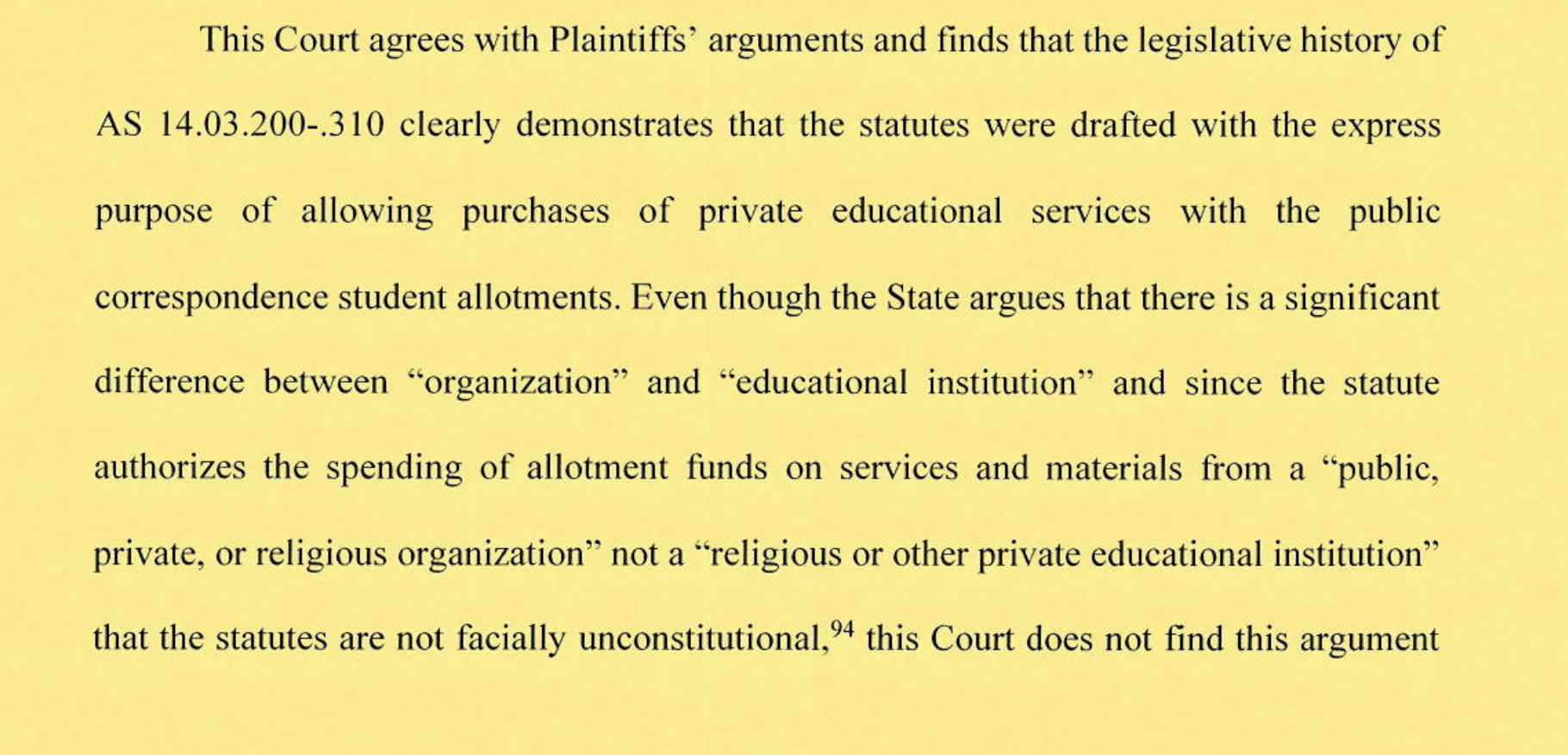Judge strikes down private education allotments Dunleavy pushed in 2014, upending push for school vouchers
An Anchorage Superior Court judge struck down a plan championed by Sen. Mike Dunleavy in 2014 to spend public money to benefit private schools, declaring it is clearly unconstitutional.
The Alaska Constitution prohibits spending public money on private schools.
Judge Adolf Zeman said there “is no workable way to construe the statutes to allow only constitutional spending and AS 14.03.300-310 must be struck down as unconstitutional in their entirety.”
I wrote about Dunleavy’s push for a new charter school authorization plan that would lead to private school vouchers the other day. His voucher vision is founded on the scheme for educational allotments he inserted into state law a decade ago while in the Senate.
Even at the time Dunleavy said the plan required a constitutional amendment to make it legal. The desired Dunleavy amendment was never approved by the Legislature, however, and not placed before the voters. The law went into effect under a legal cloud.
There now appear to be thousands of families using public funds to subsidize tuition and other expenses at private schools, collecting allotments from state correspondence schools.
The law was challenged by parents and teachers in 2023, after the wife of the attorney general promoted the allotments as a way to pay for private school tuition. Zeman granted summary judgement to the parents and teachers in a decision that is clearcut.
As Dunleavy said a decade ago, the Constitution also prohibits spending funds with “private or religious educational service providers.”
The judge wrote that the “plain text of the statutes clearly authorizes purchasing educational services and materials from private organizations with public funds, in direct contravention of the direct benefit prohibition of the Alaska Constitution.”
Here is the court ruling released Friday.
It is a major decision with important implications for education in Alaska and a legal defeat for the Dunleavy administration and Attorney General Tregarrick Taylor, whose own family promoted the allotment provisions to pay part of the tuition at a private school.
Zeman said if the Legislature believes the expenditures are necessary, “then it is up to them to craft constitutional legislation to serve that purpose—this is not this court’s role.”
Zeman said the plain language of the Alaska Constitution, the minutes of the constitutional convention, and precedent determined by the Alaska Supreme Court “unequivocally demonstrate” that allowing public money to go to private education is illegal.
In Fairbanks, for instance, hundreds of families with students at the Catholic Schools have been able to get up to $2,560 in public funds a year by enrolling kids in both the public BEST homeschool and the Catholic school. Families with two students in elementary school and one in high school have qualified for up to $7,760 a year in allotments.
In May 2022, the wife of Attorney General Tregarrick Taylor said she would seek $8,000 in public funds from the Family Partnership Charter School in Anchorage to subsidize their children’s tuition at a private school in Anchorage. That school is now a correspondence school.
“My two youngest school-age children attend St. Elizabeth Ann Seton (SEAS) private school. They attend full time and are also enrolled in the Anchorage School District’s Family Partnership Charter School (FPCS),” wrote right-wing activist Jodi Taylor, who was chair of the Alaska Policy Forum board.
“Next year, I will request that FPCS use funds in our correspondence study program annual student allotment to reimburse our family up to $4,000 for each of our children,” she wrote.
Taylor and others at the Alaska Policy Forum, one of Dunleavy’s go-to support groups, have promoted the plan to spend public funds on private schools. It has described the plan as a first in the nation.
Taylor’s decision to promote her family’s use of the allotment program elevated its profile and alerted more Alaskans to its inherent conflict with the Constitution.
Dunleavy’s 2014 statements that the allotment plan was illegal without a constitutional amendment that was never approved did not help the state’s case. The Department of Law claimed that a “legislator’s opinion about what the constitution requires is of no matter,” but he was the chief promoter and his opinion did matter.
Attorney Scott Kendall, who represented the plaintiffs, told the Alaska Beacon that the ruling will not stop correspondence programs.
“What is prevented here is this purchasing from outside vendors that have essentially contorted the correspondence school program into a shadow school voucher program,” he said. “So that shadow school voucher program that was in violation of the Constitution, as of today, with the stroke of a pen, is dead.”
Your contributions help support independent analysis and political commentary by Alaska reporter and author Dermot Cole. Thank you for reading and for your support. Either click here to use PayPal or send checks to: Dermot Cole, Box 10673, Fairbanks, AK 99710-0673.
Write me at dermotmcole@gmail.com.


